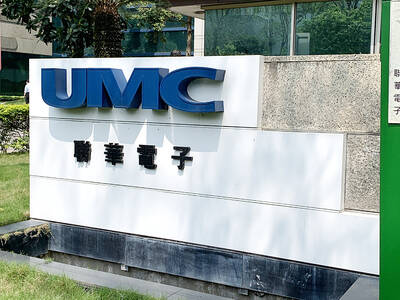Profits at large Chinese industrial companies declined last year, reflecting widespread corporate pain stemming from falling prices and weak demand both at home and overseas.
Industrial profits at large-scale Chinese companies decreased 2.3 percent last year from 2022, data published by China’s National Bureau of Statistics (NBS) on Saturday show.
That annual number contrasted with an end-of-year surge, after last month’s profits soared 16.8 percent from the same month in 2022. That was a slower pace than November’s 29.5 percent increase. Both months reflected a rebound in output from a year earlier, when nationwide COVID-19 outbreaks shuttered factories in many major cities.

Photo: AFP
“Overall, industrial profits maintained the recovery momentum in 2023,” the NBS said in a statement, noting the annual decline narrowed from 2022 as monthly profits resumed growth since August last year.
China would seek to “expand domestic demand, lift market confidence, invigorate various industry participants,” and try to sustain and boost the recovery, it said.
While China hit its conservative target of about 5 percent growth last year, an expected post-pandemic boom failed to materialize as a property market slump dragged on the world’s second-largest economy. That has spurred Beijing to ramp up measures to aid growth without flooding the system with so-called “big stimulus.”
Industrial profits have been improving since last summer, a sign many companies are approaching the end of a destocking cycle. In another positive sign, industrial output expanded 6.8 percent last month, the fastest pace since 2021. A year-on-year decline in producer prices also slowed from November last year, reducing the hit to profitability.
Total industrial profits are determined by changes in output, prices and profit margins. Industrial producers increased their margins over the course of last year, official data showed, as they cut costs per unit of revenue.
Signs of deflation have become more prevalent across China, casting doubt on whether the surge in industrial profits can be sustained.
Authorities still face pressure to keep the stimulus coming. Economists are expecting further cuts to the reserve requirement ratio — which determines the amount of cash banks must keep in reserve — over the rest of the year, in addition to modest policy-rate reductions.
The People’s Bank of China on Wednesday last week announced that it would cut the reserve requirement ratio by 0.5 percentage points on Monday next week to provide 1 trillion yuan (US$140.91 billion) in long-term liquidity to the market. The central bank has signaled more targeted stimulus to guide money toward specific sectors of the economy.

MAJOR BENEFICIARY: The company benefits from TSMC’s advanced packaging scarcity, given robust demand for Nvidia AI chips, analysts said ASE Technology Holding Co (ASE, 日月光投控), the world’s biggest chip packaging and testing service provider, yesterday said it is raising its equipment capital expenditure budget by 10 percent this year to expand leading-edge and advanced packing and testing capacity amid strong artificial intelligence (AI) and high-performance computing chip demand. This is on top of the 40 to 50 percent annual increase in its capital spending budget to more than the US$1.7 billion to announced in February. About half of the equipment capital expenditure would be spent on leading-edge and advanced packaging and testing technology, the company said. ASE is considered by analysts

TRANSFORMATION: Taiwan is now home to the largest Google hardware research and development center outside of the US, thanks to the nation’s economic policies President Tsai Ing-wen (蔡英文) yesterday attended an event marking the opening of Google’s second hardware research and development (R&D) office in Taiwan, which was held at New Taipei City’s Banciao District (板橋). This signals Taiwan’s transformation into the world’s largest Google hardware research and development center outside of the US, validating the nation’s economic policy in the past eight years, she said. The “five plus two” innovative industries policy, “six core strategic industries” initiative and infrastructure projects have grown the national industry and established resilient supply chains that withstood the COVID-19 pandemic, Tsai said. Taiwan has improved investment conditions of the domestic economy

Huawei Technologies Co’s (華為) latest smartphones carry a version of the advanced made-in-China processor it revealed last year, results from an independent analysis showed. This underscored the Chinese company’s ability to sustain production of the controversial chip. The Pura 70 series unveiled last week sports the Kirin 9010 processor, research firm TechInsights found during a teardown of the device. This is a newer version of the Kirin 9000s, made by Semiconductor Manufacturing International Corp (SMIC, 中芯) for the Mate 60 Pro, which had alarmed officials in Washington who thought a 7-nanometer chip was beyond China’s capabilities. Huawei has enjoyed a resurgence since

IMPROVEMENT EXPECTED: The company holds a cautiously optimistic view about this year, an official said, adding that an increase in wafer shipments is predicted United Microelectronics Corp (UMC, 聯電) yesterday reported its weakest quarterly net profit in three years, which it attributed to a prolonged inventory correction. However, the company said it expects wafer shipments to grow about 3 percent this quarter as demand from communication and computer segments is to pick up from last quarter. Net profit plunged 35.4 percent to NT$10.46 billion (US$321.6 million) in the first quarter of the year, compared with NT$16.18 billion a year earlier, making it the worst quarterly performance since the first quarter of 2021. On a quarterly basis, net profit declined 20.8 percent from NT$13.2 billion, the Hsinchu-based